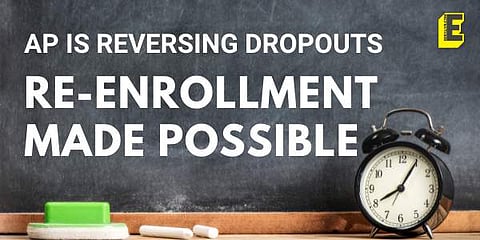

That the pandemic worsened the school drop-out situation in India is no secret. In July this year, the Indian Express reported that 60,253 students had dropped out of school in the last year. Almost two lakh students between Classes I - XII moved from private schools to government establishments. The overall rate of dropout among school students was up by an average of three to four per cent in many districts in the state, according to official data.
These numbers were collected as part of a survey conducted by around 50 cluster resource persons and part-time instructors in April this year. They discovered that a majority of these school students had been pulled out to help with agricultural lands during a time of economic distress, thanks to the pandemic. These officials were charged with the responsibility of counselling the kids back into the education system and a glance at the new data released by the education department shows that the move has returned decent dividends.
Calling them back to school
Andhra Pradesh reported a return of 8,631 school students back into the fold of education and a majority of these were granted admission into seasonal hostels and 1,524 into non-residential schools. Madrasas admitted about 1,683 students and 77 kids found their way into residential schools.
Chief Minister YS Jagan Mohan Reddy has been vocal about making education of a decent standard accessible to all. One of his biggest mandates during the election was his promise to reimburse fees and with the Vidya Deevena and Vasathi Deevena schemes launched this year for post-matric education, he seems to be keen on walking the talk as well. Schemes are also aplenty for school education, with the two flagship measures Nadu-Nedu and Amma Vodi seeming worthy of taking the credit for bringing students back to school.
As part of the Nadu-Nedu (meaning then-now in Telugu) programme, the government has redeveloped and upscaled about 45,000 government schools in the state, equipping them with, among other things, an English lab, and other infrastructure for modern education. The Amma Vodi scheme grants mothers of students in Classes I - XII an annual sum of Rs 15,000. These two schemes combined seem to have bolstered confidence in public education. Then there is also the plan to convert all schools to the Central Board of Secondary Education (CBSE) module. A few days ago, the Jagan administration also claimed that those schools that do not, for some reason, shift to CBSE will be transformed into the ICSE module.
Incentives galore
Then there are measures such as the Sweccha programme for government schools and colleges which aims to encourage students who menstruate to attend school in comfort, with the setting up of hygiene facilities such as free sanitary napkins, incinerators and waste-baskets, in addition to a slew of awareness sessions. This initiative was an effort under the Nadu-Nedu programme. The Vidya Kanuka scheme, which provides students with textbooks, school bags and uniforms, was also an effort launched to draw kids to education after the financial crisis brought upon by the pandemic.
Whether or not these measures alone deserve credit for the encouraging re-enrollment rate, it cannot be denied that the Jagan Mohan Reddy government recognises the need to give a fillip to the education system. About 3,000 students remain out of school and the Joint Collector of the East Godavari district informed The New Indian Express that these students have been identified and the state is considering a re-survey to get them enrolled in schools as well.
